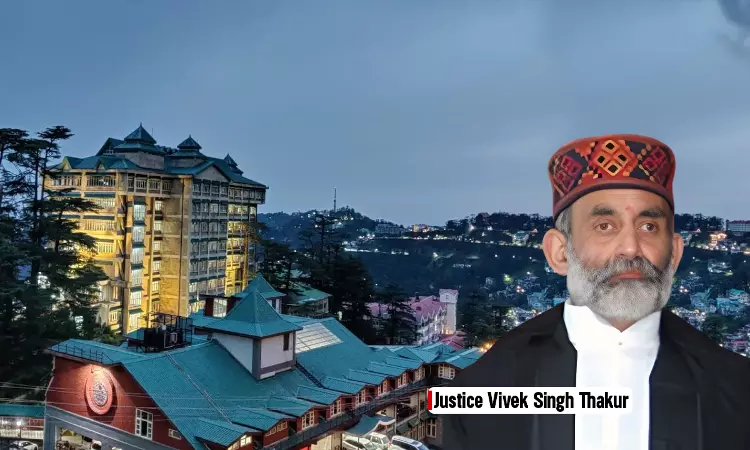- Home
- /
- High Courts
- /
- Himachal Pradesh High Court
- /
- MV Act | Married Daughters Of...
MV Act | Married Daughters Of Deceased Entitled To Compensation For Loss Of Consortium, Not For Loss Of Financial Dependency
Mehak Aggarwal
19 Jun 2025 10:38 AM IST
Himachal Pradesh High Court held that under the Motor Vehicles Act, compensation for loss of income is only awarded to family members who were financially dependent on the deceased. However, married daughters, though not financially dependent on their father, are still entitled to compensation under the head of loss of consortium.Justice Vivek Singh Thakur: “The dependent legal heirs,...
Himachal Pradesh High Court held that under the Motor Vehicles Act, compensation for loss of income is only awarded to family members who were financially dependent on the deceased. However, married daughters, though not financially dependent on their father, are still entitled to compensation under the head of loss of consortium.
Justice Vivek Singh Thakur: “The dependent legal heirs, apart from compensation under other heads, shall also be entitled for loss of consortium, whereas other family members who are not dependent-legal heirs of the deceased, though, shall not be entitled for compensation but shall be entitled for loss of consortium which is awarded for personal loss of love and affection, guidance and psychological, emotional losses etc.”
Background Facts:
On 10th July 2009, the deceased, Surat ram, while returning from work with his colleague, boarded a bus insured by Oriental Insurance Company. As the bus was crowded, the deceased stood near the door. So when the driver applied sudden brakes, he fell out of the bus and was injured when the rear tyre ran over his left leg.
He was taken to IGMC Hospital, Shimla, by his colleague, who also gave a statement to the police, blaming the driver's rash driving for the accident. Based on his statement, an FIR was registered against the driver. Unfortunately, the deceased died on the same day.
Subsequently, the police filed a charge sheet against the driver for causing death by negligent driving. The family members of the deceased filed a claim petition before the Motor Accident Claims Tribunal. After evaluating the evidence, the tribunal awarded compensation of Rs.15,80,000/- to the claimants.
Aggrieved by the decision of the Motor Accident Claims Tribunal, Oriental Insurance Company filed an appeal before the High Court.
Contentions:
The Insurance Company contended that the claimants had not proven that the bus driver was driving rashly, as no independent eyewitness were examined. It was only the colleague of the deceased who gave a statement. It also submitted that the deceased was partly responsible for the accident, as he had been standing negligently near the door.
The Company further pointed out that the deceased's age was wrongly considered to be 50 years based on the postmortem report. However, according to the family register maintained by the gram panchayat, the deceased, was born in 1954, and at the time of the accident in 2009, he was actually 55 years old.
Therefore, it submitted that since the deceased was close to the retirement age of 58, a multiplier of 11 should have been applied instead of 13.
The Insurance Company also claimed that the amounts awarded for loss of estate, funeral expenses, and loss of consortium were wrongly granted, and that the overall compensation was excessive.
In response, the claimants contended that the deceased died due to the rash and negligent driving of the bus driver, which was evident from the statement of the eyewitness, recorded in the FIR, and supported by the investigating officer's testimony.
The claimants further submitted that the compensation awarded by the Motor Accident Claims Tribunal was on the lower side, and therefore they requested an enhancement of the compensation.
Findings:
The Court stated that the statement of the deceased's colleague was reliable, as he was present at the time of the accident. Also, his statement was consistent and also recorded in the FIR. The Court observed that his testimony could not be questioned merely because he knew the deceased. Regarding the absence of other eyewitnesses, the Court noted that it is common for people to avoid involvement in police and Court proceedings.
The Court rejected Insurance Company's contention that the deceased was partly at fault, stating that this contention was not raised before the Motor Accident Claims Tribunal and no evidence was produced to support it.
However, the Court accepted that the deceased was 55 years old at the time of death and held that the compensation should have been calculated using a multiplier of 11 instead of 13.
The Court further observed that out of the six claimants, only the wife and son of the deceased were financially dependent, and hence entitled to loss of compensation, including loss of income.
The four married daughters, not being financially dependent on their deceased father, were not entitled to compensation for loss of income but were awarded ₹40,000 each for loss of consortium. The Court clarified that loss of consortium is different from loss of financial dependency, as it related to emotional and personal loss, and may be granted even to non-dependent family members, like married daughters in this case.
Accordingly, the High Court modified the compensation, based on the deceased's correct age of 55 years, and awarded the wife and son a compensation of 13,28,220 for loss of financial dependency, along with 40,000/- each for loss of consortium. However, the married daughters were only givencompensation of 40,000/- each for loss of consortium.
Case Name: Oriental Insurance Com. Ltd. v/s Satya Devi and others
Case No.: FAO No.4165 of 2013
Date of Decision: 20.05.2025
For the Appellant: Mr.G.C. Gupta, Sr. Advocate with Ms.Meera Devi Advocate vice Mr.Deepak Gupta, Advocate.
For the Respondents: Mr. Ashir Kaith, Advocate viceMr.Hamender Singh Chandel, Advocate for respondents No.1 to 6. Mr. P.P. Chauhan, Advocate for respondents No.7 and 8.



